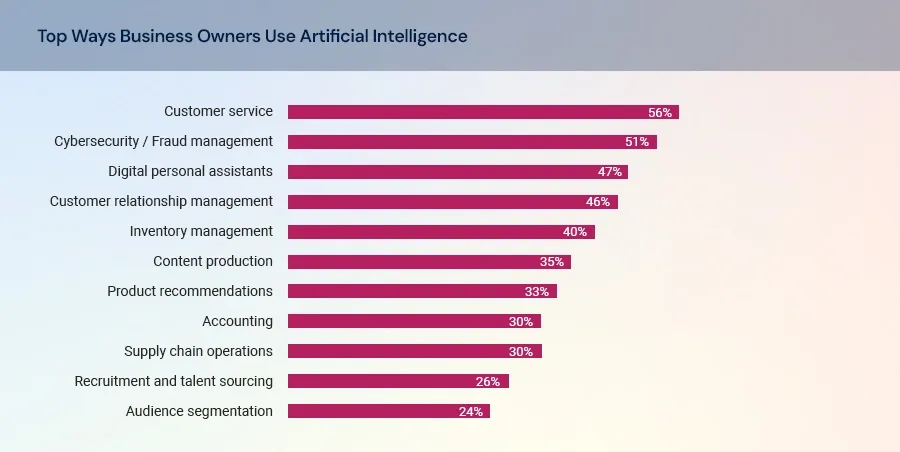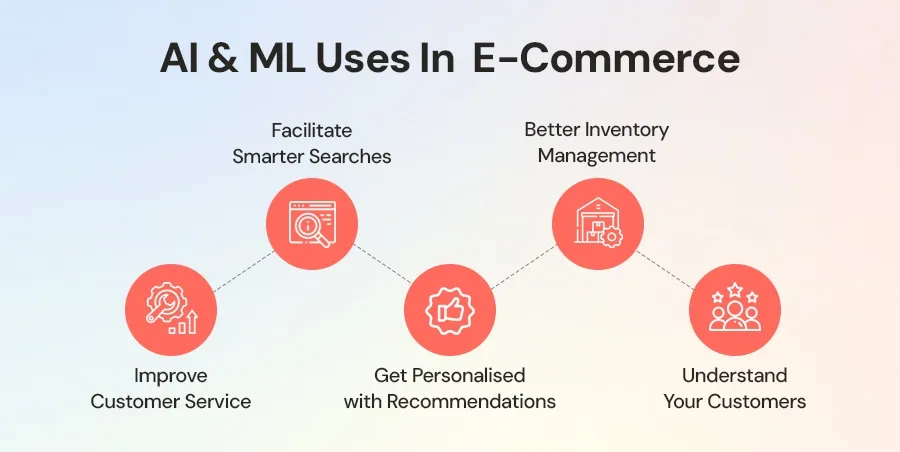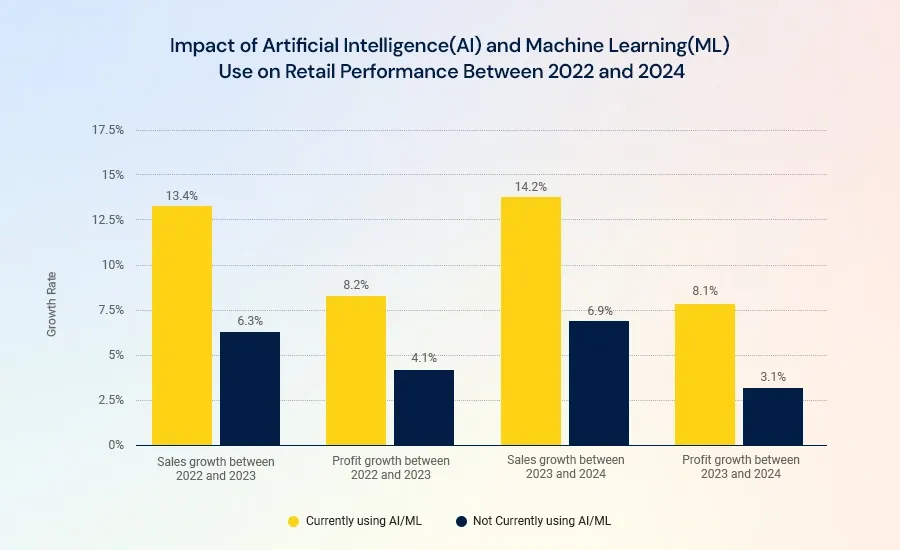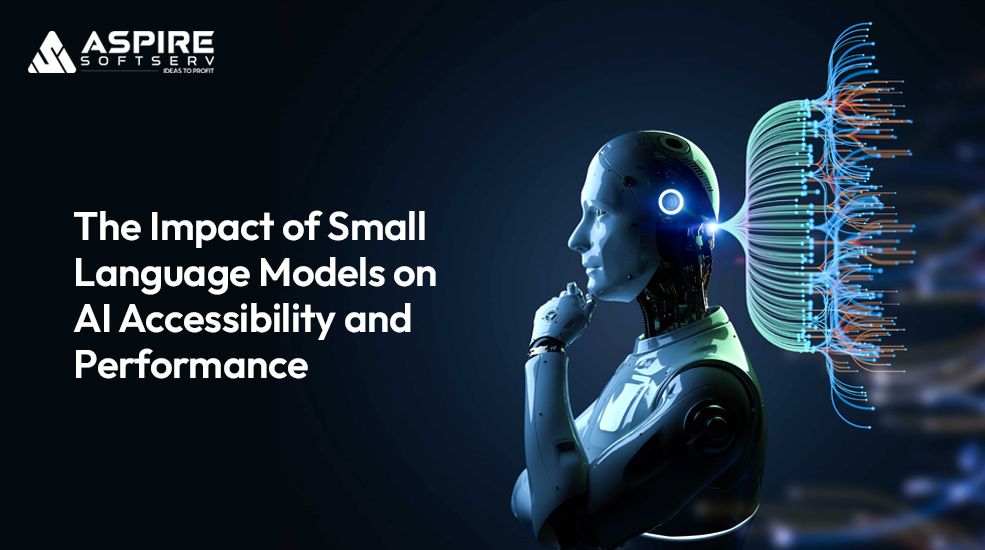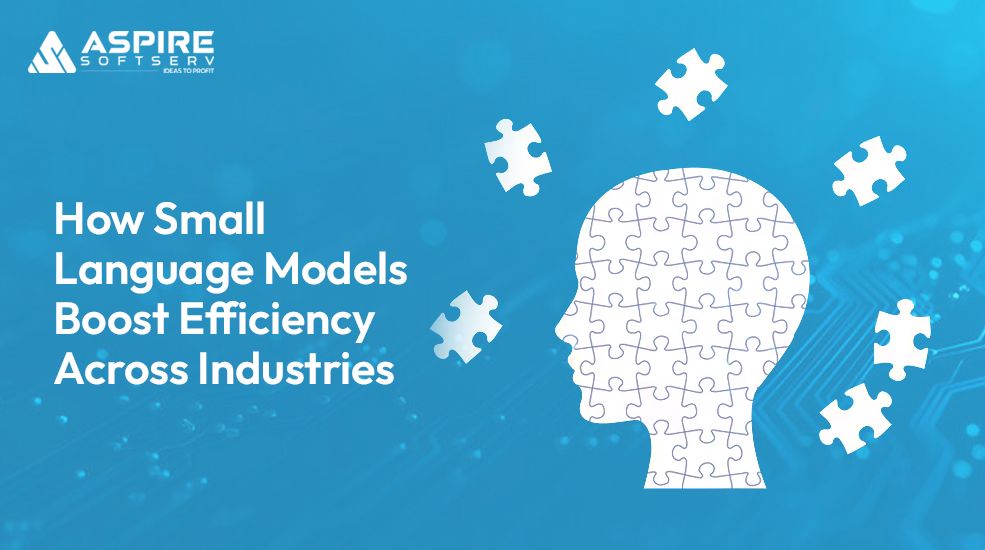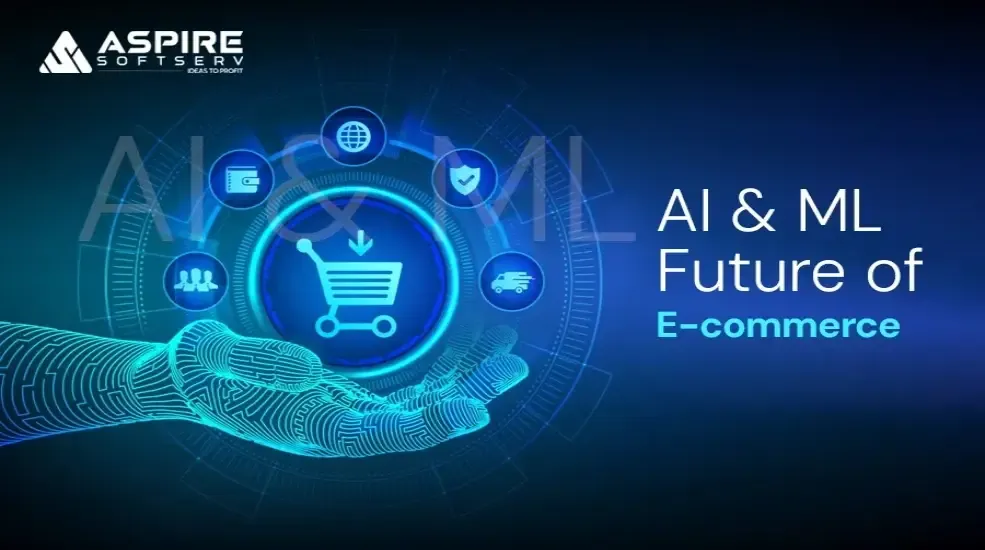
ChatGPT first emerged a few years ago, it attracted much worldwide attention. The chatbot became one of the biggest examples of machine learning. It shows that AI can do many things better than humans as well.
Machine learning and Artificial Intelligence in e-commerce are not only about chatbots. They are also used in many different things. Retailers use AI and ML tools for many other reasons. These include personalization, data analytics, dynamic pricing, and recommendation engines.
The impact of artificial intelligence on e-commerce is transformative and revolutionizing. They use machine learning algorithms to enhance customer experience. They also gain deeper insights from analytics.
What is Artificial Intelligence and Machine Learning?
While AI and ML tools are interchangeable, they are very different concepts.
What is Artificial Intelligence(AI)?
Artificial Intelligence includes lots of different techniques. These techniques help computers to act like human intelligence. There are many examples of artificial intelligence. Siri, Cortana, and Alexa are one of them. AI helps with online shopping. You can see it in voice search or products suggested on your website or application.
Fact: The implementation of AI in e-commerce can boost profitability rates by 59% by 2035.
What is Machine Learning?
Machine Learning is a part of Artificial Intelligence. It involves teaching a machine to learn from the data. ML model analyzes data to look for patterns. ML systems are not explicitly programmed, unlike traditional programming. They learn from past data to make predictions or decisions.
Fact: Machine learning can enhance customer satisfaction by over 10%
A classic example of machine learning in e-commerce is recommendation engines. These systems analyze user data, such as past purchases, preferences, and budget constraints. They use this information to make suggestions for products. These suggestions are made as per each customer’s interests and needs.
When AI and ML work together in e-commerce, they work together to make things better. The field is always changing for retailers. AI and ML together help make new and better ways for customers to interact. They work together to make things better for customers. They also create new business opportunities.
AI and ML Uses In E-commerce
Improve Customer Service
Running an e-commerce store is very difficult. It works all the time even when we are asleep. When technology was less developed, answering customer questions was very difficult. It was especially hard during odd hours.
The idea of being woken up to answer questions from faraway time zones might have seemed scary. It could be hard to handle. But the advent of AI, particularly chatbots, has changed the quality of customer service in a better way.
Chatbots, being available and responsive, offer immediate help. They use machine learning to understand each customer's needs. With this, they provide tailored responses to the customers at the time of their purchase. By collecting data and analyzing behaviour, chatbots help customers to get a seamless shopping experience.
One of the advantages of chatbots is that they can match any company’s personality. hey can adapt to the company's way of doing things. They can be made to represent the brand's values. This helps customers feel related to the brand. This personalization eliminates delays and impersonal interactions. It helps lead to increased conversions. If you want to put in place this effectively:
1. Start by infusing your chatbot with your brand’s values.
2. Ensure that interactions reflect your brand while maintaining brevity and clarity in responses.
3. Aim to resolve customer queries promptly.
See Our Latest Projects: Document AI
Facilitate Smarter Searches
Have you also struggled to look for what you want in the online stores? It can be difficult sometimes. In physical stores, some human assistants guide customers with their desired items. In online stores, there are no such things called human assistants. It all works with the help of AI and ML. These tools help them do things better.
This helps enhance search capabilities. By understanding long search terms, AI makes searching better. It also helps figure out what customers are looking for. It improves it from adequate to exceptional.
With the help of machine learning, e-commerce stores can easily predict customer preferences. This allows suggestions as per customers to meet their individual needs. Studies show that smart speakers are used for finding restaurants and controlling home devices.
It also involves adding items to shopping lists. Voice search represents a transformative shift in shopping behaviour, demanding business attention. To optimise the search experience:
1. Make sure that the search box is easily accessible. Also, make sure to add an autocomplete feature to streamline the process and reduce errors.
2. Enable users to search within specific departments. It will give them better precision.
3. Enhance product labelling and metadata. This will increase search result accuracy. It will benefit both the customers and the merchants.
Get Personalised With Recommendations
E-commerce stores can analyse their customers’ behaviour on any website with the help of artificial intelligence. These algorithms can accurately predict which products customers like to prefer more than the other choices. And then, the e-commerce stores can generate recommendations as per their customer’s preferences.
Amazon is one of the best examples of this practice. It uses browsing and purchase history to suggest to customers which products they would likely choose. This approach not only benefits Amazon but also increases the customer experience. Customers can easily look through items without being inundated with irrelevant products.
This level of hyper-personalization has started to become increasingly desirable among customers. With the help of these tailored recommendations, e-commerce stores can signify a significant advancement. Back then, online shops could only suggest popular items to everyone. This was before they could offer more personalised recommendations. This personalized approach contributes to improved conversions. It caters to the specific preferences of individual customers. To increase store recommendations:
1. Show a list of suggested products based on the customer’s past browsing history.
2. Add features such as frequently bought together and related to items you've viewed.
3. Personalize the user experience by showcasing items related to past purchases. It increases relevance and satisfaction.
Better Inventory Management
Keeping the right amount of inventory can be difficult for eCommerce sellers. They don't want too much or too little. It impacts both profitability and sales potential. There are many difficulties in terms of inventory management. Many companies struggle to track their stock effectively. In the United States alone, 46% of companies admit to neglecting inventory tracking. This leads to over $1 trillion of capital tied up in inventory. It's hard to predict how much will sell, so sometimes there's too much or too little. This can cause cash flow problems.
The help of AI in inventory management processes offers a solution. Artificial Intelligence-driven forecasting helps in making more precise predictions of future demand. It helps in streamlining the supply chain control. It also provides insights into customer behaviours. So, shrinkage is minimized, and operational efficiency is enhanced. This leads to savings in both time and capital. To optimize inventory management:
1. Transition from qualitative to quantitative forecasting methods. Use inventory management tools to make data-driven decisions based on past product performance.
2. Assess carrying cost, when you are restocking your inventory. It helps in maintaining an optimal inventory level. It also cuts unnecessary expenses.
3. Use inventory management tools to mitigate the risks of overstocking or understocking.
Understand Your Customers
If you want your business to achieve greater heights, you must understand your customers. Understanding them helps you meet their needs better. AI offers valuable insights that can enhance brand loyalty through personalized experiences.
With the help of machine learning, AI studies customer data. It helps businesses in deciding how to sell and market their products. It ultimately predicts individual preferences and behaviors with remarkable accuracy.
Through sophisticated journey analytics, AI uncovers hidden opportunities. This helps businesses to provide hyper-personalized experiences tailored to each customer. To capitalize on these insights:
1. Segment email lists to send more personalized emails. These emails resonate with specific customer preferences.
2. Install a chatbot to engage with customers and gather valuable data. This data helps businesses improve their products and services. It makes them better at giving customers what they want.
See Also: Discover Why Python Is the Ultimate Game-Changer for AI/ML
Conclusion
If you're not sure about new AI and ML technology, it's okay. If you are excited by big companies doing well, it's still good for stores to try new things. Embracing innovation helps stores keep up and maybe even do better. Every retailer should understand the importance of using new technology. It helps to give them a competitive edge. This can make their business better.
These advancements can make business processes better. They can also make customer experiences easier. They can help businesses find the right customers. And they can help businesses grow into new places. No matter how you feel at first, it's really important not to ignore these new ideas. They could be really helpful for your business!
The key is to make a good plan. Then, put together a team that believes in the new technology. It's important to be patient and learn how to use the new technology or you can hire an AI development services provider. Sometimes, you might need to change your plan.
We can help you get your hands on AI and ML tech with the help of our experts.
Give a Booster to Your Business With AI and ML

